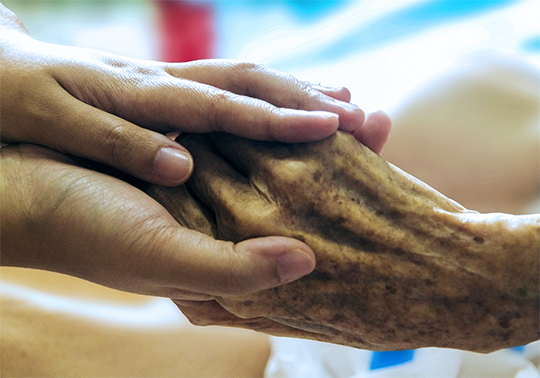Women have took care of dependent people during the crisis in the metropolitan area of Valencia
- February 20th, 2017

Woman has been the main responsible for the assistance to people in situation of dependence in the domestic environment during the beginning of the crisis in 2007. At the same time, it has been produced a “refamiliarisation” or home assistance to these needy people. An article published by researchers of the Universitat de València also claims the “(re)nativitation” or the partial return of women to the care for dependents.
The analysis carried out by Óscar Muñoz and Josep V. Pitxer, from the Faculty of Social Sciences, confirms that, in the framework of a crisis initiated in 2007, the care for dependent people in the domestic environment has been the most frequent option. It also confirms that factors of choice of assistance method have been economics and cultural. When it’s time to dedice who is in charge of taking care of dependents in the family level, women are still the main responsible for the assistance, despite some changes in family models.
The fieldwork of research, carried out in the metropolitan area of Valencia, emphasises that women have been “the main character of the assistance in the reproductive sphere and have been the one who have to face the challenge of juggling the work and family life. And, this has negative effects in the presence and the results obtained in the labour market”, have highlighted two researchers.
The lack of economic capacity of a significant number of families “has lead them to give up the recourse to the financial market. This fact, together with a sufficient supply of public services, has provided a movement towards refamiliarisation of the cares. Undoubtedly, a clear process of decommercialization took place, according to the used terminology by the authors on the article “Los cuidados en un contexto de crisis económica. El caso del área metropolitana de Valencia”, published in the journal Inguruak.
In other cases, according to the experts, “cheaper commercial alternatives has been sought, especially in informality context, such as (re)nativitation or the return of the indigenous women to these activities which are paid. Regarding the consequences, many women have take on some precarious and atypical part-time jobs.
“This fact has caused a higher probability of being in precarious situations and, additionally, a loss of the economic autonomy”, states Óscar Muñoz. This circumstance is coherent with the protagonist achieved by the secondary labour marker, which is characterised by the existence of low wages, negative labour conditions and job instability. “A portion of the labour market to which people with less bargain power, such as certain social classes, ethnicities or races, and also several young people and women are exposed," claimed researchers at the Faculty Of Social Sciences.
“Public policies should be geared to cover the called emerging social risk, among which the dependent people care is found. In this context it is necessary to take side, and the society model we want is at stake: either the state provides greater coverage or protection, or we leave the State role to be residual so the market lodge with the coverage of these needs, "said Oscar Muñoz.
Services delivery modalities
Eleven interviews have been made thoroughly, semi-structured, to relevant actors within the metropolitan area of Valencia. The aim of the research has been the identification of dependent people care services delivery modalities, the determination of the factors conditioning the choice of the coverage modality chosen by each family, the construction of a framework of possible labour strategies for families, ascertaining who is responsible for the work of care and also the evaluation of the impact of the crisis on all these elements.
Article:
Óscar Muñoz González et al. Los cuidados en un contexto de crisis económica. El caso del área metropolitana de València. Inguruak [60] | 2016 | 102-121. ISSN: 0214-7912
















